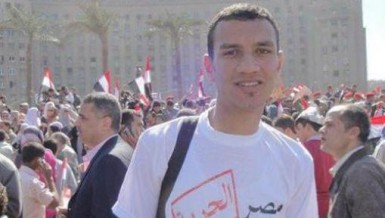Egypt has seen an increasingly hostile environment to freedom of expression and assembly over the past three months, said the International Federation for Human Rights (FIDH) in a statement on Wednesday.
“What we are seeing here is either the result of pressure exerted by the Egyptian authorities on the media, or a demonstration of zealous self-censorship,” said FIDH president Karim Lahidji in the statement. “But promoting freedom of expression and guaranteeing freedom of the press is what we’d rather expect from the interim authorities if they really want to stand out from the authoritarian line followed by their predecessors.”
FIDH highlighted the suspension of satirist Bassem Youssef’s programme Al-Bernameg, along with trials of journalists before military tribunals as part of a wide crackdown on freedom of expression.

( Public Domain Photo)
“FIDH considers that referring journalists to military tribunals and condemning them to heavy sentences sets a dangerous precedent and will eventually prevent journalists from reporting independently in sensitive areas involving the military,” the rights group added.
FIDH also considered the shutting down of Islamist satellite channels and others that supported ousted president Mohamed Morsi a violation of freedom of expression, adding that presenters responsible for incitement to violence, as well as on state television media, “should be held accountable individually.”
The crackdown, according to FIDH, extended to freedom of assembly and considered the draft protest law a “repressive bill that not only puts draconian restrictions on the right to demonstrate, but imposes other curbs on the right to public meetings, strikes, sit-ins, and processions, thus utterly stifling the freedom of Egyptians to engage in all forms of peaceful assembly.”
“There have been many violations against protesters and demonstrations over the last three months as well as violations against journalists and especially cameramen,” said Nada Kabbary, media spokeswoman for the Association for Freedom of Thought and Expression (AFTE), pointing to military trials of journalists that have occurred.
Kabbary considered 2013 “one of the worst years for journalists in Egypt in all aspects,” saying that there had already been more than 80 cases of violations before the military crackdown that began in July, and continued through the dispersal of Rabaa Al-Adaweya sit-in. AFTE will issue a report at the end of the year highlighting the documented violations, said the spokeswoman.
The country also continues seeing trials and convictions of contempt of religion, a trend that accelerated in 2011 and continued during Morsi’s tenure and the current interim government’s.
Earlier this week Reporters without Borders (RSF) issued a report titled “New wave of attacks on freedom of information,” saying that military trials, arbitrary arrests, and abusive treatment in detention were being used by Egyptian authorities to “maintain their campaign of repression.”
“This policy reflects a continuation of practices in effect since 2011,” said the RSF report. “The successive governments in place since the fall of Hosni Mubarak- the Supreme Council of the armed forces, the Muslim Brotherhood, and today’s transition regime led by [Minister of Defence] General Abdel Fattah Al-Sisi- have all been determined to repress the media and control information.”

(DNE File Photo)
Hatem Aboul Nour, Mohamed Sabry, and Ahmed Abu Deraa are three journalists that have been sentenced in military courts since Morsi’s ouster.
Mohamed Adel, a member of 6 April Youth Movement’s political bureau and a member of the Egyptian Centre for Economic and Social Rights, also saw an increase in violations on the freedom of expression under the current interim government, saying that the police had returned to some of its older practices of closely monitoring activists, even those not belonging to the Muslim Brotherhood. He also pointed to the draft protest law, which the cabinet discussed earlier this week, as a means by which the government would seek to crack down on the freedom of assembly.
